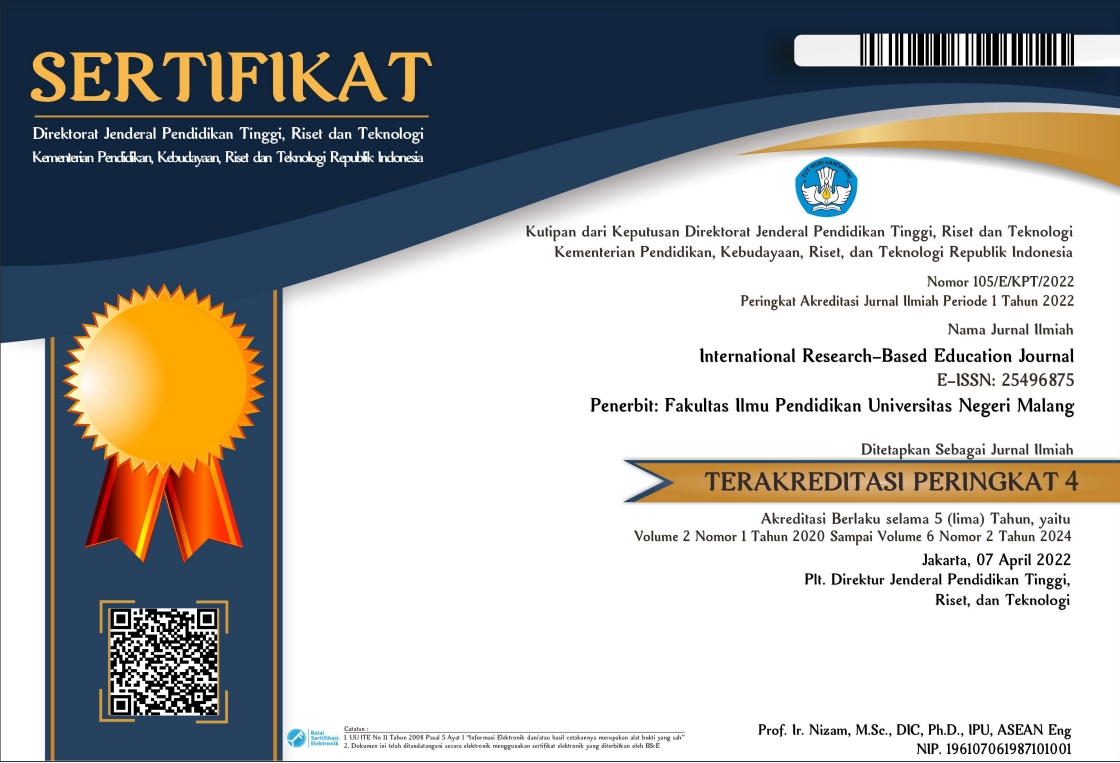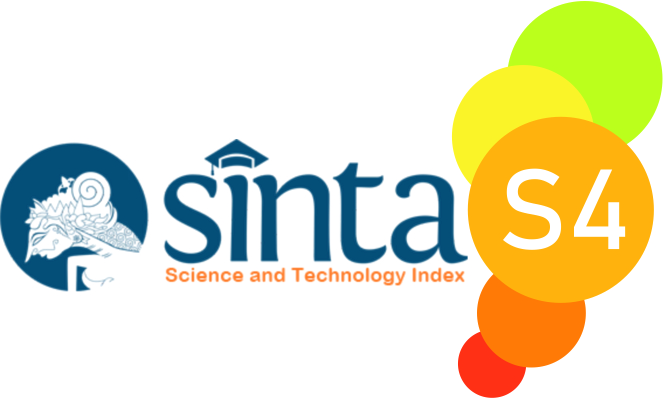Assessment in Indonesian Higher Education: Developing a Reading Comprehension Test for English Students
Abstract
Keywords
Full Text:
PDFReferences
Bachman, L.F. & Palmer, A.S. (2014). Language testing in practice: Designing and developing useful language tests. Oxford: Oxford University Press.
Borg, W.R. & Gall, M.D. (1983). Educational research: An introduction. New York: Longman.
Borg, W.R and Gall, M.D. (2003). Educational research: An introduction (4th Ed). London: Longman Inc.
Brown, H. D. & Abeywickrama, P. (2010). Language assessment: Principles and classroom practices (2nd Ed). London: Pearson Education.
Brown, J. D. & Yamashita, S.O. (1995). Language testing in Japan. Tokyo: Japan Association for Language Teaching.
Butler, S. M., & McMunn, N. D. (2006). A teacher's guide to classroom assessment: understanding and using assessment to improve student learning. San Francisco, CA: Jossey-Bass.
Cahyono, B. Y., & Widiati, U. (2006). The teaching of EFL reading in the Indonesian context: The state of the art. TEFLIN Journal, 17(1), 23-46.
Department of Education and Training. (2021, May 7). Assessment of student achievement and progress foundation to 10. Retrieved from https://www2.education.vic.gov.au/pal/assessment-student-achievement/policy.
Fotis, D., & Mentzas, G. (2006). Competency based management: A review of systems and approaches. Information Management & Computer Security, 14(1), 51-64.
Griffin, P. E., & Nix, P. (1991). Educational assessment and reporting: A new approach. Sydney: Harcourt Brace Jovanovich.
Gronlund, N. E., & Waugh, C. K. (2009). Assessment of student achievement (Vol. 9th). Upper Saddle River, N.J: Pearson.
Harmer, J. (2015). The practice of English language teaching (5th ed.). London: Pearson Education.
Hoge, A., Tondora, J., & Marelli, A. F. (2005). Strategies for developing competency models. Administration and Policy in Mental Health. Vol. 32 (5), 533-561.
Lamb, M., & Coleman, H. (2008). Literacy in English and the Transformation of Self and Society in Post-Soeharto Indonesia. International Journal of Bilingual Education and Bilingualism, 11(2), 189-205. doi: 10.2167/beb493.0
Masduqi, H. (2014). EFL reading in Indonesian universities: Perspectives and challenges in cultural contexts. Journal of teaching and education, 3(3), 385–397. http://www.universitypublications.net/jte/0303/pdf/V4G339.pdf.
Masduqi, H., Fatimah, F., & Subiyanto, A. (2021). Qualitative research into reading in English as a foreign language in Indonesia – Quo Vadis? Indonesian TESOL Journal, 3(2), 76-87. http://ejournal.iainpalopo.ac.id/index.php/ITJ/article/view/1805.
Plomp, T. (1997). Development research on/in educational development. Netherlands: Twente University
Powell, R. (2003). Taking multiple choice exam. Melbourne: University of Victoria Press.
Scriven, M. (1967). The methodology of evaluation. In R.W.Tyler (Ed.), Perspectives of curriculum evaluation (pp. 39-83). Chicago: Rand McNally.
Setiono, S. (2004). Competency-based learning: The dreams and realities, The Jakarta Post. June 29, 2004.
Shohamy, E. (1996). Open ended questions vs. closed ended questions. New York: Allyn and Bacon.
Thompson, C. (2002). Types of reading. Bloomington, Indiana, USA: ERIC Clearinghouse on Reading & Communication Skills.
Weigle, S. C. (2002). Assessing writing. Cambridge, UK: Cambridge University Press.
Yorke, M. (2003). Formative assessment in higher education: Moves towards theory and the enhancement of pedagogic practice. Higher Education, 45(4), 477-501. doi:10.1023/A:1023967026413.
DOI: http://dx.doi.org/10.17977/um043v4i1p1-13
Refbacks
- There are currently no refbacks.

This work is licensed under a Creative Commons Attribution-NonCommercial-ShareAlike 4.0 International License.










1.png)


